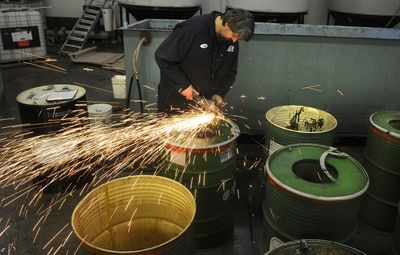Biodiesel industry revs up
Local companies will use new, recycled oil

A biodiesel plant under construction for the past couple of years in Odessa, west of Spokane, is up and running.
Inland Empire Oilseeds produced its first 15,000-gallon batch of biodiesel last weekend.
“Hopefully by the end of this run we’ll have 30,000 gallons of oil,” said general manager Steve Starr.
Producers usually make canola biodiesel by pressing seeds. But Empire Oilseeds’ first batch is converted canola oil, which arrives by railcar.
The Lincoln County company plans to open a crushing facility by June and begin purchasing canola seeds from area farmers, Starr said. “We had about 80 farmers at our last meeting just a few weeks ago,” he said.
Empire Oilseeds is privately owned and has received some low-interest business loans from the state. When the plant reaches full capacity next year, Starr said it will employ about 18.
While some herald biodiesel as an alternative to petroleum-based fuel, it has its critics. Virgin vegetable oils used for some biofuels – or corn used to make ethanol – should be used for food, some say.
“My response to that would be that our biodiesel production is much different than ethanol production,” Starr said. “The majority of what’s left after we crush (canola) seed goes to cattle feed. And we use much less energy to make this oil than it takes to make some other biofuels.”
And canola is a good rotation crop, meaning it improves soil quality when grown between the traditional wheat plantings, especially in the Inland Northwest, Starr said. “Rotating canola increases wheat yields,” he added.
Some biodiesel companies take the food or fuel question completely out of their process.
Doug Bartlett is the CEO and president of the five-month-old Spokane County Biodiesel, which hopes to produce biodiesel out of used restaurant oil and grease by next spring.
“With waste vegetable oil, we are taking a recycled product and we make a fuel out of it,” Bartlett said.
He said using waste oil instead of virgin oil leads to a higher energy yield when all costs are taken into consideration.
Spokane County Biodiesel plans to produce about 1 million gallons of biodiesel a year by converting used cooking oils and other vegetable grease from local restaurants and dining halls.
“We are in the first phase right now, which means we are processing and cleaning the waste vegetable oil we collect,” Bartlett said. The waste vegetable oil is then shipped to plants in the Portland area or in Burbank, Wash., where it’s converted to biodiesel.
“The bigger distributors have it beaten into their heads that all they can use is virgin vegetable oil,” Bartlett said. “That’s not the case; ours will be just as good.”
Spokane County Biodiesel’s oil will comply with federal standards and regulations, just like biodiesel produced by big fuel companies such as Chevron or Shell.
Bartlett and his staff are lining up local fuel distributors who’ll either sell the biodiesel straight or mix it with conventional diesel and oil products before putting it on the market.
“I think we’ll be the only ones who convert waste vegetable oil, and keep everything local,” Bartlett said.
Jim Armstrong, communications director for the Spokane County Conservation District, said he likes that business model.
“If we use feed and/or food stock for fuel, then we come up against a lot of complications with how that impacts our food supply,” Armstong said. “If we use a product that is recycled, like waste vegetable oil, then we don’t run into the whole philosophical discussion of food for fuel.”
When it comes to biodiesel, the use of virgin materials and used ones are both good for the environment, Bartlett said, and both make fuels with lower emissions than crude diesel. “I just think it makes more sense to make fuel out of something that’s essentially trash,” he said.